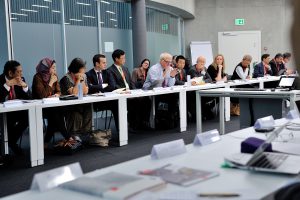
More than 20 professors, researchers and students work directly on SDG 10. Their work includes academic publications, academic and executive education, and engagement in external initiatives. We also offer an Executive Master in Development Policies and Practices, as well as academic Masters and PhD programmes and courses on International Economics.


The Linear, the Circular and the Suspended: Disentangling Temporalities at Azraq Refugee Camp

Finance & Development Expertise: Debt Sustainability in Africa

International Political Economy

Covid-19 and Human Rights of Migrants

Nature-Positive Economy Q&A

Entretien avec le Dr Dêlidji Eric Degila

Global Experts in Local Contexts: Why Legitimation Strategies Matter?

Lithium Mining in the Atacama Salt Flats and its Impacts

Shining a light on the Social Dimension of Sustainable Finance

Development Economics

World Bank presents Global Economic Prospects Report on Recovery from Pandemic
Discover more SDGs
View moreGoal 10 calls for “reducing inequalities in income as well as those based on age, sex, disability, race, ethnicity, origin, religion or economic or other status within a country. The Goal also addresses inequalities among countries, including those related to representation, migration and development assistance” as put by the UN Sustainable Development Knowledge Platform. Read more about Goal 10